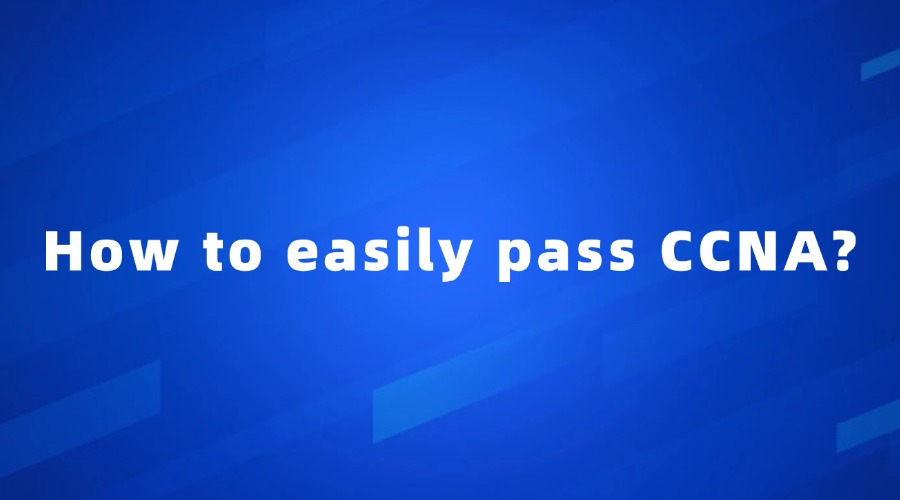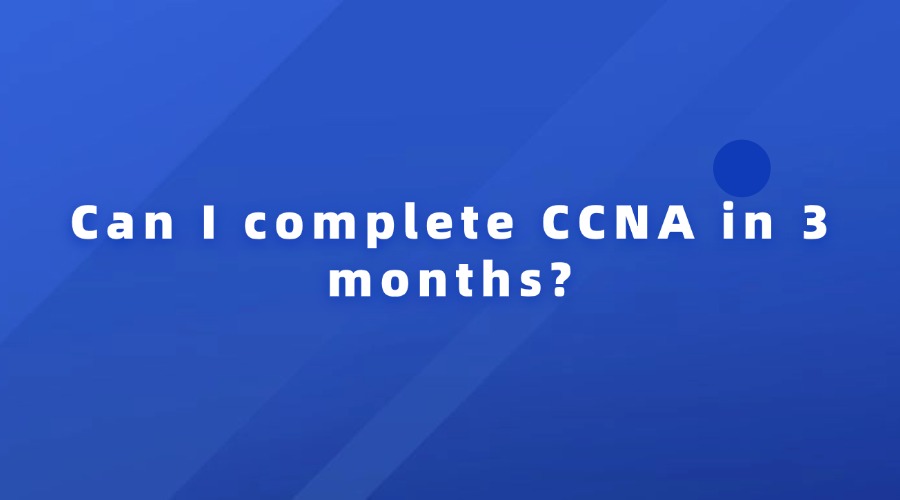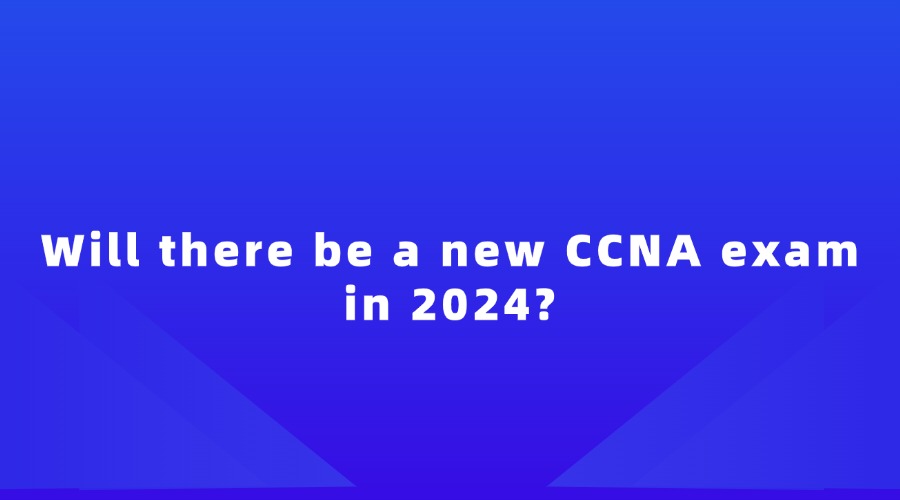Is CCNP a hard exam?
Update time:2024-10-28
The Cisco Certified Network Professional (CCNP) certification is a highly regarded credential in the networking field, aimed at professionals who want to validate their advanced networking skills. But one of the most common questions from those considering the exam is: "Is the CCNP a hard exam?" The short answer is yes, it can be challenging, but the level of difficulty largely depends on your experience, preparation, and understanding of networking concepts. In this article, we’ll break down what makes the CCNP exam challenging, what you need to know to prepare, and how to overcome the difficulties associated with it.

Understanding the Structure of the CCNP Exam
The CCNP certification requires passing two exams: one core exam and one concentration exam. These exams are designed to test your knowledge in a specific networking area, such as enterprise, security, or data center. The exams include multiple-choice questions, drag-and-drop scenarios, and hands-on simulations, making them a comprehensive evaluation of both theoretical knowledge and practical skills.
Core Exam: This is a mandatory exam that covers fundamental technologies in your chosen track (e.g., Enterprise, Security, Data Center). It is more extensive and tests a broad understanding of networking concepts. The core exam typically has around 90 to 120 questions.
Concentration Exam: This is a specialized exam that allows you to focus on a specific area of networking. It is narrower in scope but still quite demanding. The concentration exam typically has 60 to 90 questions.
Both exams last 90 minutes, and the questions require not just memorization but also the ability to apply knowledge in practical situations, such as configuring networks or troubleshooting issues.
Why Is the CCNP Exam Considered Difficult?
The CCNP exam is considered challenging for several reasons:
1. Depth and Breadth of Knowledge: The CCNP exam covers a wide range of advanced networking topics. Whether you’re focusing on routing and switching, security, or collaboration, you will need a deep understanding of protocols, configurations, and troubleshooting. The core exam tests a broad range of foundational technologies, while the concentration exam dives deeper into specialized topics. This dual-level of knowledge requirement can be overwhelming for candidates who are not well-prepared.
2. Practical Application: Unlike some certifications that rely solely on multiple-choice questions, the CCNP exam includes hands-on simulations and real-world problem-solving scenarios. You might be asked to configure routers, troubleshoot networks, or solve complex routing issues within a simulated environment. This means that you need not only theoretical knowledge but also practical experience with Cisco devices and configurations.
3. Advanced Concepts: The CCNP exams are geared toward professionals with an intermediate to advanced level of understanding of networking. Concepts like advanced routing protocols (e.g., OSPF, EIGRP, BGP), Virtual Private Networks (VPNs), network automation, and security measures can be difficult to master. Candidates without sufficient hands-on experience or advanced study may find these topics particularly challenging.
4. Time Management: Each exam has a limited time (90 minutes), and with up to 120 questions, you’ll need to manage your time efficiently. The hands-on simulation questions can take longer to complete, making it difficult to answer all the questions within the allotted time. Time pressure can add to the perceived difficulty of the exam.
Contact me immediately to get the golden key helping you fast express your certificate. What Do You Need to Succeed?
While the CCNP exam is difficult, success is achievable with the right preparation. Here’s what you need to focus on to give yourself the best chance of passing:
1. Solid Foundation in Networking: Before attempting the CCNP, you should have a strong foundation in networking principles. Cisco recommends having at least 3 to 5 years of experience working with networking technologies. If you’ve already earned a CCNA (Cisco Certified Network Associate), that’s a good start, but the CCNP goes much deeper into the topics introduced at the associate level.
2. Hands-On Experience: The hands-on simulations are a key part of the exam, and they require actual experience configuring and troubleshooting Cisco networks. If you don’t have access to physical Cisco equipment, you can use online tools like Cisco Packet Tracer or GNS3 to practice. Gaining real-world experience by working with Cisco devices in your job or through lab exercises is crucial for passing the exam.
3. Study the Exam Blueprint: Cisco provides an exam blueprint for each CCNP track, which details the topics that will be covered on the exam. Use this blueprint to guide your studies and ensure that you’re covering all the important areas. Don’t neglect any section, even if you feel more comfortable in some areas than others. The exam may throw unexpected questions your way, so a comprehensive understanding is essential.
4. Use Multiple Study Resources: Relying on one resource for exam preparation is not enough. Use Cisco’s official study materials, and engage with study groups. There are also plenty of third-party resources available, including books, video tutorials, and practice exams. The more varied your study materials, the better prepared you’ll be for the different types of questions you’ll encounter.
5. Take Practice Exams: Practice exams are an excellent way to gauge your readiness and familiarize yourself with the exam format. They help you identify weak areas and adjust your study plan accordingly. Timed practice exams also help you manage your time effectively, so you’re not caught off guard during the real exam.
Overcoming the Challenges
The CCNP exam is tough, but with the right approach, you can overcome its challenges. Here are some additional strategies to help you succeed:
Break Down Complex Topics: Don’t try to learn everything at once. Break down complex topics into smaller, more manageable sections. For instance, if you’re studying BGP, start with the basics of the protocol before diving into advanced configuration options. This approach helps solidify your understanding and prevents burnout.
Lab Practice: Setting up your own lab environment is one of the best ways to prepare for the CCNP exam. Practice configuring routers, switches, and firewalls. The more familiar you are with Cisco’s IOS command-line interface (CLI), the more confident you’ll be during the hands-on simulation questions.
Stay Updated on Industry Trends: Networking technology is constantly evolving, and Cisco exams reflect that. Stay informed about new trends like network automation, software-defined networking (SDN), and security threats. Understanding how these technologies impact modern networks can give you an edge in answering exam questions that deal with current real-world scenarios.
Manage Stress and Time: The pressure of time and the complexity of the questions can make the exam stressful. To manage this, practice answering questions under timed conditions, and develop strategies for dealing with difficult questions, such as flagging them and moving on, then returning to them later.
Conclusion
Yes, the CCNP exam is hard, but it is not impossible. The difficulty comes from the depth of knowledge required, the practical skills needed for simulations, and the broad range of advanced topics. However, with the right preparation, including hands-on experience, thorough study, and practice exams, you can successfully pass the CCNP exam. By dedicating the necessary time and effort, you’ll not only earn a valuable certification but also enhance your career prospects in the networking field.
I'm your man who have the 100% valid dumps , buy it now for 50% off to clear your exam!
Click it ↓↓

Understanding the Structure of the CCNP Exam
The CCNP certification requires passing two exams: one core exam and one concentration exam. These exams are designed to test your knowledge in a specific networking area, such as enterprise, security, or data center. The exams include multiple-choice questions, drag-and-drop scenarios, and hands-on simulations, making them a comprehensive evaluation of both theoretical knowledge and practical skills.
Core Exam: This is a mandatory exam that covers fundamental technologies in your chosen track (e.g., Enterprise, Security, Data Center). It is more extensive and tests a broad understanding of networking concepts. The core exam typically has around 90 to 120 questions.
Concentration Exam: This is a specialized exam that allows you to focus on a specific area of networking. It is narrower in scope but still quite demanding. The concentration exam typically has 60 to 90 questions.
Both exams last 90 minutes, and the questions require not just memorization but also the ability to apply knowledge in practical situations, such as configuring networks or troubleshooting issues.
Why Is the CCNP Exam Considered Difficult?
The CCNP exam is considered challenging for several reasons:
1. Depth and Breadth of Knowledge: The CCNP exam covers a wide range of advanced networking topics. Whether you’re focusing on routing and switching, security, or collaboration, you will need a deep understanding of protocols, configurations, and troubleshooting. The core exam tests a broad range of foundational technologies, while the concentration exam dives deeper into specialized topics. This dual-level of knowledge requirement can be overwhelming for candidates who are not well-prepared.
2. Practical Application: Unlike some certifications that rely solely on multiple-choice questions, the CCNP exam includes hands-on simulations and real-world problem-solving scenarios. You might be asked to configure routers, troubleshoot networks, or solve complex routing issues within a simulated environment. This means that you need not only theoretical knowledge but also practical experience with Cisco devices and configurations.
3. Advanced Concepts: The CCNP exams are geared toward professionals with an intermediate to advanced level of understanding of networking. Concepts like advanced routing protocols (e.g., OSPF, EIGRP, BGP), Virtual Private Networks (VPNs), network automation, and security measures can be difficult to master. Candidates without sufficient hands-on experience or advanced study may find these topics particularly challenging.
4. Time Management: Each exam has a limited time (90 minutes), and with up to 120 questions, you’ll need to manage your time efficiently. The hands-on simulation questions can take longer to complete, making it difficult to answer all the questions within the allotted time. Time pressure can add to the perceived difficulty of the exam.
Contact me immediately to get the golden key helping you fast express your certificate. What Do You Need to Succeed?
While the CCNP exam is difficult, success is achievable with the right preparation. Here’s what you need to focus on to give yourself the best chance of passing:
1. Solid Foundation in Networking: Before attempting the CCNP, you should have a strong foundation in networking principles. Cisco recommends having at least 3 to 5 years of experience working with networking technologies. If you’ve already earned a CCNA (Cisco Certified Network Associate), that’s a good start, but the CCNP goes much deeper into the topics introduced at the associate level.
2. Hands-On Experience: The hands-on simulations are a key part of the exam, and they require actual experience configuring and troubleshooting Cisco networks. If you don’t have access to physical Cisco equipment, you can use online tools like Cisco Packet Tracer or GNS3 to practice. Gaining real-world experience by working with Cisco devices in your job or through lab exercises is crucial for passing the exam.
3. Study the Exam Blueprint: Cisco provides an exam blueprint for each CCNP track, which details the topics that will be covered on the exam. Use this blueprint to guide your studies and ensure that you’re covering all the important areas. Don’t neglect any section, even if you feel more comfortable in some areas than others. The exam may throw unexpected questions your way, so a comprehensive understanding is essential.
4. Use Multiple Study Resources: Relying on one resource for exam preparation is not enough. Use Cisco’s official study materials, and engage with study groups. There are also plenty of third-party resources available, including books, video tutorials, and practice exams. The more varied your study materials, the better prepared you’ll be for the different types of questions you’ll encounter.
5. Take Practice Exams: Practice exams are an excellent way to gauge your readiness and familiarize yourself with the exam format. They help you identify weak areas and adjust your study plan accordingly. Timed practice exams also help you manage your time effectively, so you’re not caught off guard during the real exam.
Overcoming the Challenges
The CCNP exam is tough, but with the right approach, you can overcome its challenges. Here are some additional strategies to help you succeed:
Break Down Complex Topics: Don’t try to learn everything at once. Break down complex topics into smaller, more manageable sections. For instance, if you’re studying BGP, start with the basics of the protocol before diving into advanced configuration options. This approach helps solidify your understanding and prevents burnout.
Lab Practice: Setting up your own lab environment is one of the best ways to prepare for the CCNP exam. Practice configuring routers, switches, and firewalls. The more familiar you are with Cisco’s IOS command-line interface (CLI), the more confident you’ll be during the hands-on simulation questions.
Stay Updated on Industry Trends: Networking technology is constantly evolving, and Cisco exams reflect that. Stay informed about new trends like network automation, software-defined networking (SDN), and security threats. Understanding how these technologies impact modern networks can give you an edge in answering exam questions that deal with current real-world scenarios.
Manage Stress and Time: The pressure of time and the complexity of the questions can make the exam stressful. To manage this, practice answering questions under timed conditions, and develop strategies for dealing with difficult questions, such as flagging them and moving on, then returning to them later.
Conclusion
Yes, the CCNP exam is hard, but it is not impossible. The difficulty comes from the depth of knowledge required, the practical skills needed for simulations, and the broad range of advanced topics. However, with the right preparation, including hands-on experience, thorough study, and practice exams, you can successfully pass the CCNP exam. By dedicating the necessary time and effort, you’ll not only earn a valuable certification but also enhance your career prospects in the networking field.
I'm your man who have the 100% valid dumps , buy it now for 50% off to clear your exam!
Click it ↓↓














